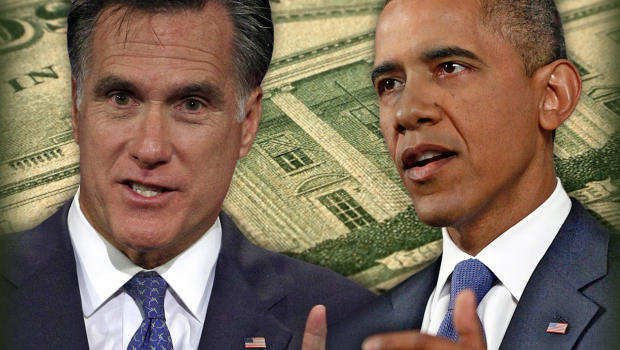New jobs report, same spin
The final jobs report before Tuesday's presidential election contained some decent news about the U.S. economy, with news of 171,000 new jobsand positively revised numbers from August and September. Even so, the political spin from both sides of the aisle sounded much as it does every month: Within minutes of the report's release, Mitt Romney and Republican leadership released a flurry of statements pounding the president for failed policies and "persistently high unemployment," while the Obama administration repeated a familiar message about the economy's steady but incomplete recovery.
The report, which produced better-than-expected job growth but also included an uptick of 0.1 percentage point to the unemployment rate, is not expected to drastically impact the outcome of the presidential election next week. Nevertheless, Republicans immediately set about trying to make the numbers work in their favor.
"Today's increase in the unemployment rate is a sad reminder that the economy is at a virtual standstill. The jobless rate is higher than it was when President Obama took office, and there are still 23 million Americans struggling for work," said Republican presidential candidate Mitt Romney in a statement. "On Tuesday, America will make a choice between stagnation and prosperity. For four years, President Obama's policies have crushed America's middle class...When I'm president, I'm going to make real changes that lead to a real recovery, so that the next four years are better than the last."
House Speaker John Boehner echoed a familiar message - via a statement that in parts sounds eerily familiar to what he said last month around this time.
"Four years of persistently high unemployment and long-term joblessness might be the best President Obama can do - but it's nowhere near what the American people can do if we get Washington out of their way," he said. "The American people deserve better. The House has already approved bipartisan legislation to stop all of the tax hikes, replaced the defense 'sequester,' and passed straightforward bills cutting red tape and saving programs like Medicare from bankruptcy." (After the September jobs report, Boehner made similar points: He said that "job creation is far too slow and the unemployment rate is far too high" and underscored that the "House passed a bipartisan bill to stop all of the president's tax hikes.")
Reince Priebus, meanwhile, argued that "America desperately needs jobs and cannot afford four more years like the last four. After four years of the Obama presidency, unemployment remains painfully high, and incomes are not growing. America needs and deserves a real recovery, but Obama has proven incapable of delivering." (Here's Priebus last month: "Americans cannot afford four more years like the last four years... High unemployment remains a chronic condition in America, the seriousness of which is measured not simply by one number but by the millions of families trying to make ends meet in an impossible economy.")
The White House was even more egregious in rehashing its rhetoric: The first paragraph of a memo by Alan Krueger, chairman of the White House council of economic advisers, was exactly the same as the intro from the memo from last month. There was also an indicative typo at the beginning of the October note, which said "Alan B. Krueger, Chairman of the Council of Economic Advisers, issued the following statement today on the employment situation in September."
"While more work remains to be done, today's employment report provides further evidence that the U.S. economy is continuing to heal from the wounds inflicted by the worst downturn since the Great Depression," he wrote. "It is critical that we continue the policies that are building an economy that works for the middle class as we dig our way out of the deep hole that was caused by the severe recession that began in December 2007."
Further down in the White House memo, Krueger highlights the October report's positive data -- but the rhetoric surrounding it could hardly have been more similar. The memo's second paragraph, which addressed the White House's attempts to pass middle class tax cuts and other measure, included a couple minor tweaks from the language last month.
Ultimately, the similarity in how both sides respond to the job reports month after month reflects the seemingly outsized impact the numbers have taken on in this electoral cycle. Both sides are eager to capitalize on any possible advantage in what is expected to be an exceptionally tight election grounded in arguments about which candidate would do a better job of fixing the economy. But as CBS News' Jill Schlesinger writes, Americans don't necessarily cast their votes based on what BLS reports -or the politicians spinning them - come up with.
"If voters view the Great Recession as an extreme event, which no president since FDR had to confront, and they focus on the slow improvement to the labor market, then Obama will win," Schlesinger writes. "If voters believe that Obama's policies were not the right ones to turn around the jobs market faster, despite the unique circumstances, they will elect Romney."
